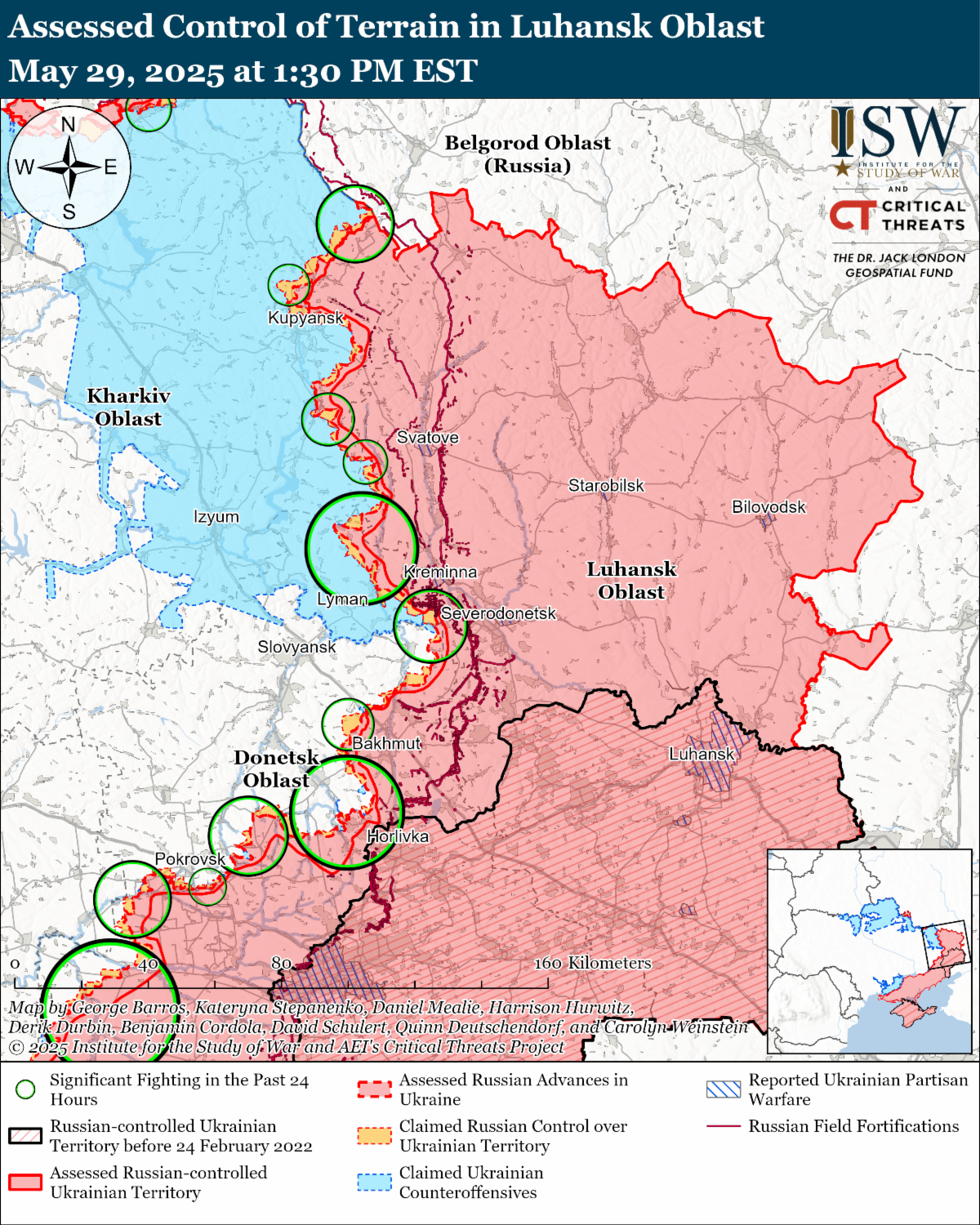Russian officials continue to dictate the terms and timing of peace negotiations with Ukraine and are attempting to obfuscate the current state of negotiations. Russian officials are setting conditions to falsely accuse Ukraine of delaying negotiations. Russian Foreign Minister Sergei Lavrov claimed on May 28 that Russia is prepared to present its memorandum on terms for peace negotiations during the next bilateral meeting with Ukraine and suggested that Russian and Ukrainian representatives should meet in Istanbul on June 2. Lavrov claimed that Russia's memorandum proposes how to "reliably" overcome the Russia's perceived "root causes" of the war in Ukraine. Lavrov has previously defined the root causes of the war in Ukraine as NATO's eastward expansion following the collapse of the Soviet Union in the 1990s and the Ukrainian government's alleged discrimination against Russian speakers and Russian culture. Russian Presidential Aide Vladimir Medinsky, who led the last Russian delegation in Istanbul, claimed on May 28 that he spoke with Ukrainian Defense Minister Rustem Umerov and proposed a date for Russia and Ukraine to exchange their memoranda. Umerov responded to the Russian proposal on May 28 and stated that Ukraine is ready for a ceasefire and further negotiations and that Ukraine has already presented its memorandum to Russia. Kremlin Spokesperson Dmitry Peskov claimed on May 29 that Russia has not received a copy of Ukraine's memorandum and that Ukraine has not responded to Lavrov's proposal, however.
Russia is forcing Ukraine to make concessions on the timing, terms, and location of negotiations. Russian President Vladimir Putin initially suggested on the night of May 10 to 11 "resuming" the 2022 bilateral peace negotiations in Istanbul but later rejected Ukrainian President Volodymyr Zelensky's invitation for an in-person, one-on-one meeting in Istanbul. Ukraine's willingness to attend the May 15 to 16 talks in Istanbul with Russian officials was itself a significant concession, as holding the talks in Istanbul fit into Putin's narrative that the current talks are a resumption of the 2022 Istanbul Protocols in which Russia demanded that Ukraine effectively capitulate to Russia. US President Donald Trump previously suggested that Russia and Ukraine could move peace talks to the Vatican, but Russian officials rejected this offer and continue to suggest meetings in Istanbul. Putin unilaterally announced Easter and Victory Day ceasefires in April and May 2025, and Russia is now again unilaterally imposing timelines and terms on Ukraine. Ukraine, the United States, and European states have repeatedly called for Russia to agree to a renewable ceasefire in Ukraine before Russia and Ukraine begin negotiations for an enduring peace, calls that the Kremlin has repeatedly rejected. Russian officials are instead demanding that negotiations address both a ceasefire and long-term peace agreement in Ukraine. Russian forces will continue to press along the frontline until Ukraine accepts Russia's terms or they are no longer able to do so, and Russian officials will attempt to leverage any additional battlefield gains to extract additional concessions from Ukraine and the West during negotiations.
ISW previously assessed that Russian forces are leveraging the fact that Ukraine and Russia set no concrete deadlines for the next steps in the peace process in order to delay the process altogether and prolong the war. Medinsky stated after the May 16 Ukrainian-Russian talks in Istanbul that the two delegations agreed to "write ... down in detail" the terms for peace and present a memorandum for a possible future ceasefire in the future, but did not specify a deadline. Putin told journalists on May 19 that Russia would present Ukraine with a "memorandum" detailing conditions and timing for a future peace treaty as the two countries move toward conducting bilateral negotiations, but also did not specify a deadline. Lavrov claimed on May 23 that Russia would present its memorandum to Ukraine as soon as Russia and Ukraine completed their large-scale prisoner of war (POW) exchange on May 25. Ukrainian Foreign Minister Andriy Sybiha stated on May 23 that Ukraine expected Russia to present a draft proposal for an unconditional ceasefire agreement after the third and final POW exchange on May 25. US Special Envoy to Ukraine General Keith Kellogg told Fox News on May 27 that the United States received Ukraine’s memorandum of conditions and timelines for a potential peace treaty and is waiting for Russia to submit its version to begin reconciling the two countries’ positions. Russian officials appear to be withholding their memorandum and may attempt to withhold the memorandum until the June 2 meeting. Russian officials may assess that Ukraine will refuse to attend the June 2 meeting if Russia does not provide its memorandum in advance as Ukraine has done and likely intend to seize on Ukraine's refusal to blame Ukraine for stalling peace negotiations.
Key Takeaways:
- Russian officials continue to dictate the terms and timing of peace negotiations with Ukraine and are attempting to obfuscate the current state of negotiations. Russian officials are setting conditions to falsely accuse Ukraine of delaying negotiations.
- Russia is forcing Ukraine to make concessions on the timing, terms, and location of negotiations.
- ISW previously assessed that Russian forces are leveraging the fact that Ukraine and Russia set no concrete deadlines for the next steps in the peace process in order to delay the process altogether and prolong the war.
- Western reporting indicates that the People's Republic of China (PRC) is increasing drone deliveries to Russia while reducing sales to Ukrainian and Western buyers, further demonstrating China's increasingly overt support for Russia's war effort in Ukraine.
- A Ukrainian defense manufacturer and official announced that Ukraine has fielded a long-range drone with sophisticated artificial intelligence (AI).
- Ukrainian forces recently advanced near Kurakhove and Russian forces recently advanced in northern Kharkiv Oblast and near Kupyansk, Borova, Lyman, and Pokrovsk.
| 




 [ISW] 이란 업데이트, 2025년 5월 29일
[ISW] 이란 업데이트, 2025년 5월 29일
 [ISW] 이란 업데이트, 2025년 5월 28일
[ISW] 이란 업데이트, 2025년 5월 28일